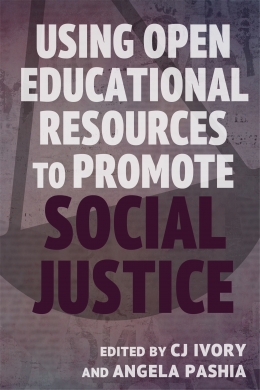Primary tabs
You don't need to be an ALA Member to purchase from the ALA Store, but you'll be asked to create an online account/profile during checkout to proceed. This Web Account is for both Members and non-Members. Note that your ALA Member discount will be applied at the final step of the checkout process.
If you are Tax-Exempt, please verify that your account is currently set up as exempt before placing your order, as our new fulfillment center will need current documentation. Learn how to verify here.
- Description
- Table of Contents
- About the authors
Using Open Educational Resources to Promote Social Justice explores the opportunities and challenges of moving the discussion about open educational resources (OER) beyond affordability to address structural inequities found throughout academia and scholarly publishing. OER have the potential to celebrate research done by marginalized populations in the context of their own communities, to amplify the voices of those who have the knowledge but have been excluded from formal prestige networks, and to engage students as co-creators of learning content that is relevant and respectful of their cultural contexts.
Edited by academic librarians with experience advocating across campus, Using Open Educational Resources to Promote Social Justice takes a multidisciplinary approach and is filled with examples of the ways OER and open pedagogy can be used to support social justice in education. In five sections, it covers a wide range of topics from theoretical critiques to multidisciplinary examples of OER development in practice to examinations of institutional support for OER development.
- Section I: Theory and Problematizing
- Section II: Open Praxis
- Section III: Decolonizing Learning in the Global South
- Section IV: Scaling Up with Institutional Policies (Approaches)
- Section V: Building and Decolonizing OER Platforms
Using Open Educational Resources to Promote Social Justice offers something for everyone who advocates for open pedagogy and OER across campus, from librarians to teaching faculty to centers for teaching and learning. It demonstrates ways that open pedagogy—and especially practices that encourage students to participate in building or localizing OER—can provide a way to incorporate a wider range of perspectives into original research projects and add these crucial perspectives into the scholarly discourse.
This book is also available as an open access edition at https://bit.ly/ACRLOERSJ.
Introduction
Section I. Theory and Problematizing
Chapter 1. The Unrealized Promise of OER: An Exploration of Copyright, the Open Movement, and Social Justice
Shanna Hollich
Chapter 2. Repairing the Curriculum: Using OER to Fill Gaps
Kevin Adams and Samantha Dannick
Chapter 3. On Being Visible: The Hidden Curriculum of Heteronormativity and Open Educational Resources
Thomas Weeks
Section II. Open Praxis
Chapter 4. Centering Justice in Content Development: A Case Study of the Police Brutality Teach-Out
Julia Maxwell, Katya Gorecki, Ryan Henyard, and Benjamin Morse
Chapter 5. Pay It Forward: Realizing The Promise of OER for the Next Generation of Learners
Kimberly S. Grotewold, Karen L. Kohler, and Elisabeth M. Krimbill
Chapter 6. Reframing Social Work Education Using OER
Jennifer Wood and Mary Jo Orzech
Chapter 7. Deconstructing Textbooks for Equity: Open Educational Resources and Culturally Responsive Pedagogy
Elissah Becknell and Rebecca March
Section III. Decolonizing Learning in the Global South
Chapter 8. Open Textbooks, Intuitive Pedagogy, and Social Justice
Glenda Cox, Bianca Masuku, and Michelle Willmers
Chapter 9. Opportunities and Challenges in the Development and Usage of Open Textbooks in Institutions of Higher Learning to Promote Social Justice
Josiline Phiri Chigwada
Chapter 10. Where Are We on the Map? The State of Open Educational Resources (OER) in Africa
Alkasim Hamisu Abdu
Section IV. Scaling Up with Institutional Policies (Approaches)
Chapter 11. Reflecting on the Institutional Organization of Academic “Knowledge” as a Barrier to OER Construction and Adoption in Higher Education Curricula
Emily M. Doyle, Kristin Petrovic, Tanya Mudry, and Murray Anderson
Chapter 12. Beyond Affordability: Developing Policy to Encourage Faculty to Explore OER as a Means to Create More Diverse, Inclusive, and Socially Conscious Course Materials
Dawn (Nikki) Cannon-Rech
Chapter 13. OER, Social Justice, and Online Professional Development to Enhance Equity, Diversity, and Inclusion at a University
Samantha Harlow and Melody Rood 229
Section V. Building and Decolonizing OER Platforms
Chapter 14. Decolonizing Wikipedia
Ian Ramjohn
Chapter 15. Using Open Educational Resources (OER) to Bring Marginalized Voices into the Music Theory Curriculum
Barbara Murphy and Claire Terrell
Chapter 16. An Institute-Based Approach to OER in Digital Caribbean Studies
Perry Collins, Hélène Huet, Laurie Taylor, Brittany Mistretta, Hannah Toombs, Anita Baksh, Nathan H. Dize, Juliet Glenn-Callender, Ronald Angelo Johnson, Aaron Kamugisha, K. Adele Okoli, Laëtitia Saint-Loubert, and Keja Valen
About the Authors
CJ Ivory
CJ Ivory is an associate professor and librarian at the University of West Georgia where she teaches information literacy and research with a focus on social justice. She is also an advocate for open education on her campus and works with faculty across disciplines to support the implementation of open textbook alternatives. She holds a bachelor’s degree in economics from the University of Central Florida and MLIS from Florida State University. Her research interests include information literacy instruction, social justice education, and open pedagogy.
Angela Pashia
Angela Pashia has over a decade of experience as an academic librarian focusing on teaching critical information literacy, mentoring colleagues, working against structural oppression within libraries, and growing as a collaborative leader. Angela’s first co-edited book (with Jessica Critten), Critical Approaches to Credit-Bearing Information Literacy Courses, was selected as an ACRL Instruction Section, Teaching Methods Committee Selected Resource in 2020. Angela currently works as professor and head of the learning and research support department at Ingram Library, University of West Georgia, and is beginning to explore opportunities to support other scholars as an academic writing and career coach.



